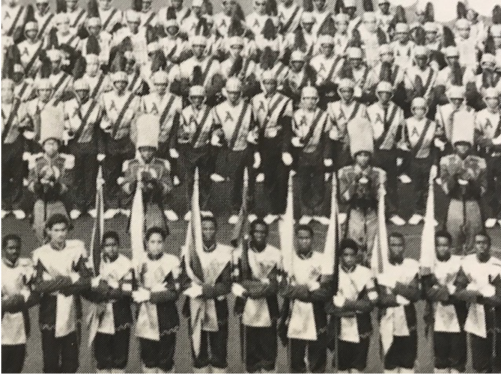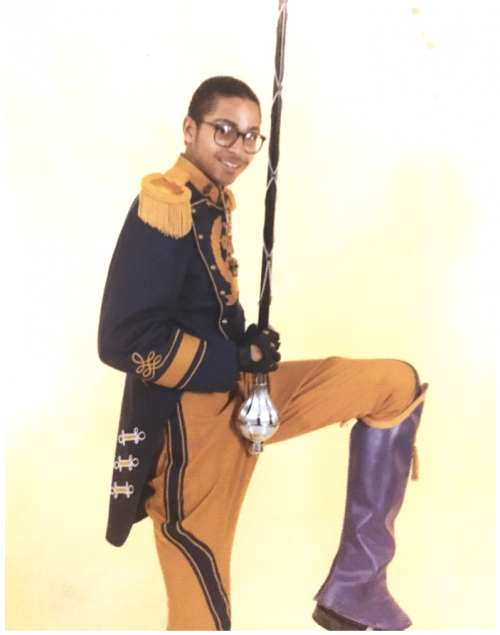When and where were you a drum major?
I was a drum major my senior year, 1985, at St. Augustine High School here in New Orleans.
What was the best thing about being a drum major during Mardi Gras?
The best thing is that you can help shape the excitement of the crowd by deciding if you play a song or not. At St. Aug., we determine the pacing of which songs we’d play, and there are some strategic things we would do.
We have a running list of maybe 20 songs, a mix of contemporary songs and traditional Mardi Gras songs, and we knew the order we would play them. But depending on the mood of the parade route, we might play something different. By any overpass, we always played for the echo. And you’re always going to play in front of Gallier Hall, and then constantly down Canal Street, since you’re nearly at the end.
You see your friends and family members in the crowds. People yell “play, play, play!” and when you do, you see this elation. It’s rewarding.
 Patrick (far left) with his fellow drum majors, 1985
Patrick (far left) with his fellow drum majors, 1985
What’s something folks wouldn’t guess about what it’s like to be a drum major?
They might not know that it’s such hard work. It looks like it’s glamorous, but you’re almost like an assistant band director, and it’s an additional responsibility—you have to carry yourself in a certain manner. You are representing what the band stands for. As a 16 or 17 year old, that’s a lot of responsibility. You also have to be able to not let it go to your head, because you are so prominent and out there. It’s hard to be humble when you’re given such a prestigious position at that age.
<< Want to read more stories like this? Sign up for the NSNO newsletter! >>
It’s also challenging, during Mardi Gras season, when you are leading the band in parades. You set an example through your endurance when you’re marching. You have to honor the people watching you by always marching, never walking. When it’s your second parade of the day and you’re coming down Canal, you see the end of the route and you’re dog tired—but people are out there to see you, and you’re at the front of the band, so you keep going. If the drum major slacks off, then the band slacks off, so you always have to perform at the highest level possible.
 St. Augustine High School “Marching 100”, 1985
St. Augustine High School “Marching 100”, 1985
What values do you learn from being a drum major?
For one, you have to be responsible. I was far from a perfect leader, but I learned that you have to be responsible.
Second, you have to understand people, and want to understand people. I didn’t interact with all the band members the same way. You learn that some people need tough love, others need you to pat them on the back, and others need you to leave them alone. A good leader is able to understand all that.
You need to know your own strengths and weaknesses. I knew I wasn’t the best musician, but I knew I commanded a presence so I played to my strengths. I wasn’t trying to be the best dancer, so I kept my moves simple whenever we were afforded the opportunity to do so.
The fourth thing is that you have to be willing to grow as a leader. I knew I didn’t know it all. I liked to think that when I started out as a drum major, I would end up better at the end of the year than I was at the beginning of the year. It’s all about wanting to grow.
 Patrick (left) plays the saxophone
Patrick (left) plays the saxophone
Do those lessons carry over to your work as a CEO today?
Absolutely. I feel responsible and accountable for all the work that we do, like I did as a drum major. The ability to read people helps me build fantastic teams, whether at the RSD or now with NSNO.
I am also very open with my team about my strengths and weaknesses; anyone who works with me can tell people where I am strong and where I am weak.
I love to learn new things. I constantly try to improve. I’m no better than anybody else, but when I am afforded opportunities, I make the most of them.
